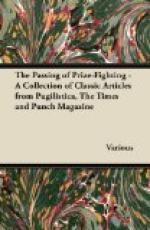The conductor of these concerts has not a single requisite for his office—he is several degrees less personable than M. Jullien—he does not even wear moustaches! and to suppose that a man can beat time properly without them is ridiculous. He looks a great deal more like a modest, respectable grocer, than a man of genius; for he neither turns up his eyes nor his cuffs, and has the indecency to appear without white gloves! His manners, too, are an insult to the lovers of the thunder and lightning school of music; he neither conducts himself, nor his band, with the least grace or eclat. He does not spread out both arms like a goose that wants to fly, while hushing down a diminuendo; nor gesticulate like a madman during the fortes; in short, he only gives out the time in passages where the players threaten unsteadiness; and as that is very seldom, those amateurs who pay their money only for the pleasure of seeing the baton flourished about, are defrauded of half their amusement. M. Musard takes them in—for it must be evident, even to them, that what we have said is true, and that he possesses scarcely a qualification for the office he holds—if we make one trifling exception (hardly worth mentioning)—for he is nothing more than, merely, a first-rate musician. With this single accomplishment, it is like his impudence to try and foist himself upon the Cockney dilettanti after M. Jullien, who possessed every other requisite for a conductor but a knowledge of the science; which is, after all, a paltry acquirement, and purely mechanical.
On the evening PUNCH was present, the usual dose of quadrilles and waltzes was administered, with an admixture from the dull scores of Beethoven. Disgusted as we were at the humbug of performing the works of this master without blue-fire, and an artificial storm in the flies, yet—may we confess it?—we were nearly as much charmed by the “Andante” from his Symphonia in A, as if the lights had been put out to give it effect. We blush for our taste, but thank our stars (Jullien included) that we have the courage to own the soft impeachment in the face of an enlightened Concert d’Ete patronising public. In sober truth, we were ravished! The pianos of this movement were so exquisitely kept, the ensemble of them was so complete, the wind instruments were blown so exactly in tune, so evenly in tone, that the whole passion of that touching andante seemed to be felt by the entire band, which went as one instrument. The subject—breaking in as it does, when least expected, and worked about through nearly every part of the score, so as to produce the most delicious effects—was played with equal delicacy and feeling by every performer who had to take it up; while the under-current of accompaniment was made to blend with it with a masterly command and unanimity of tone, that we cannot remember to have heard equalled.




